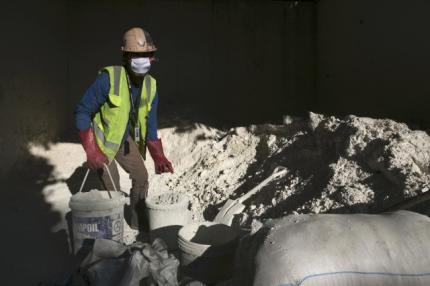Indonesia's New President Says He Will Sit Down With Miners
Bareksa • 23 Jul 2014

A worker carries limestone, used to extract lead and zinc from ore, at a smelter owned by Lumbung Mineral Sentosa in Bogor Regency south of Jakarta July 19, 2014 - (REUTERS/Darren Whiteside)
Mining companies will be hoping the new president can help reanimate negotiations.
Bareksa.com - Indonesia's new president Joko "Jokowi" Widodo said he wants to sit down with mining companies and other parties in a bid to resolve a row over mining policies that has halted $500 million of metal exports a month in Southeast Asia's biggest economy.
The comment by the former Jakarta governor, who has a reputation for tackling entrenched interests, appeared to be a positive sign after an increasingly bitter dispute between the mining sector and the outgoing government.
Until this year, Indonesia was the world's top exporter of nickel ore and a major supplier of copper, iron ore and bauxite. But a ban in January on exporting unprocessed ore and an escalating tax on metal concentrates have paralysed shipments.
"First, I want to sit down with stakeholders, investors, regulators and with the people to know the problem and find a good solution for them. I want to know the details," Jokowi said in an interview at his residence in Jakarta on Saturday, before he was declared winner of the presidential election on Tuesday.
Jokowi did not say specifically how he would handle the row over the ore ban, and when pressed on the issue an aide stepped in to say "too much detail".
But mining companies will be hoping the new president can help reanimate negotiations, which had run into trouble with the administration of outgoing President Susilo Bambang Yudhyono.
Darmawan Prasodjo, an economic adviser to Jokowi, has said that the new president would not "kill the industry" and that the government and industry were partners who should face the issue together. Prasodjo criticised the current administration for not creating the conditions for the industry to thrive.
"If you want to build a smelter, what do you need? Well, for now, exports should be opened, and power stations need to be built to meet their electricity needs, with competitive rates."
The comments suggested Jokowi may reconsider the ban on unprocessed ore exports to make it easier for firms that commit to building smelters, but that remains subject to discussion.
The mining policies were intended to increase Indonesia's returns on the minerals it produces and create jobs. But mining companies say they are causing unnecessary confusion and forcing tens of thousands of miners out of work.
Freeport-McMoRan Copper & Gold Inc and Newmont Mining Corp, which account for 97 percent of Indonesia's copper production, exported tens of thousands of tonnes of metal concentrate a month before a row over an escalating export tax, alongside the ore ban, halted shipments.
The changes have prompted a constitutional court challenge and an international arbitration case brought by Newmont Mining earlier this month.
As relations became more strained, the outgoing government threatened to revoke Newmont's contract and hand it over to state miner Aneka Tambang (Antam).
RESOURCES POLITICALLY SENSITIVE
Syahrir Abubakar, the executive director of the Indonesia Mining Association, said any move to review mining regulations would be welcomed. "There are contradictions from one article to the next, and many renegotiations have been held up because of this law."
But giving ground to foreign mining companies could still be politically difficult for Jokowi given nationalist pressure over the issue, some experts say.
Jokowi's vice president has also appeared to take a tougher line. Jusuf Kalla, a businessman from the nickel-rich eastern island of Sulawesi, was partly responsible for the mining policy when he was also vice president in 2007.
"They shouldn't be treated differently," Kalla said in a separate interview, referring to the rejection by mining companies such as Freeport and Newmont of the export tax. "It is only an export tax for two-three years."
Kalla also said there should be no tampering with the ban on unprocessed ore exports signed into law five years ago.
"It is the law. We agreed on it in 2009. We discussed it in 2007. I agree that minerals should have value added because if you export mineral ore, nickel ore ... it is not good for jobs for the country."
(Source : Reuters)